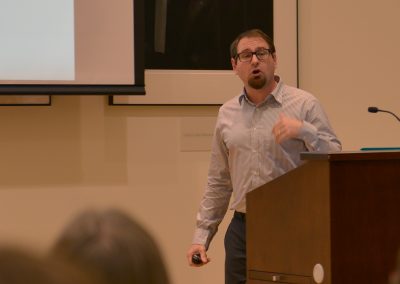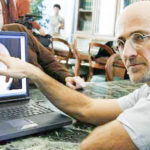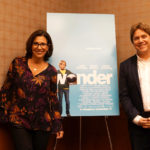
Ten Boston University professors on Tuesday night showcased their research, ranging from software development to big data, at the “Shaping the New Human-Technology Frontier: Current Research at BU” event, held as part of the Research on Tap series.
A crowd of approximately 40 professors attended gather at the School of Law’s Barristers Hall to “fostering interactions and questions across different collaborative potentials,” said event coordinator Barbara Shinn-Cunningham.
The College of Engineering professor said she, along with Vice President and Associate Provost for Research Gloria Waters, put together the speakers from a list of their colleagues and prominent professors in their fields at BU.
“[We wanted to] bring people and professors on campus together who may not be obviously connected in their research areas, but if you step back and think about where technology is going in the future, they are all interconnected down the road,” Shinn-Cunningham said.
Each speaker had four minutes to present their research topic, with the goal of spiking interest in the crowd so that the attendees could delve into details after the event.
Shinn-Cunningham gave a speech about her research on the hearing technologies, where she detailed that one third of people over 65 have hearing loss.
“We are taking knowledge of how we hear in complex settings and using that technology to build new kinds of devices,” Shinn-Cunningham said. “It is actually a pretty ripe time to rethink the hearing aid.”
Swathi Kiran, a professor in the Sargent College of Health and Rehabilitation Sciences, spoke about his research on post-stroke language rehabilitation.
“One of our bottlenecks is to find out what treatments work for what people,” Kiran said. “It is shown that patients can actually approve with individualized treatments.”
Margrit Betke, a professor of computer science in the College of Arts and Sciences, presented a series of video demonstrations on the Proficio, a robotic arm.
Then an ENG professor Edward Damiano shared the developments of the “iLet,” a fully integrated bionic pancreas.
The event transitioned to online and computer technologies with Sharon Goldberg, a professor in CAS, who spoke on why encryption matters. She shared how her lab is combatting the threat attacks.
“[They are] looking at different kinds of them, trying to understand how they can happen in different protocols, and how we can design protocols that people who can really use in order to make these attacks harder,” Goldberg said.
After the presentations, several professors said although they appreciated the research they saw during the presentations, they hoped presenters could talk more about the implications of technology advancement.
Abby Rudolph, a professor in the School of Public Health, said she attended to see how this information could address her own research.
“I wanted to see what other people were doing and see what synergies that they’re collaborating on that can help me and my research,” Rudolph said.
Juliet Floyd, a professor in the School of Theology, said she had hoped that researchers would bring up ethics while they discussed technology in this era.
“There are a lot of issues of accountability of values in algorithms and the language of accountability and responsibility that we have, does not match up,” Floyd said. “This is a very big conversation that we are only really beginning where law will have to come in and ethics.”
CAS Dean Ann Cudd also attended the event. She said that she shares Floyd’s concern.
“There’s also an issue about the kind of manipulation,” Cudd said. “We should think about the kinds of apps and devices that are made [to] select what you should pay attention to.”



